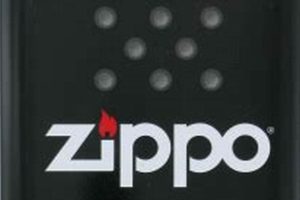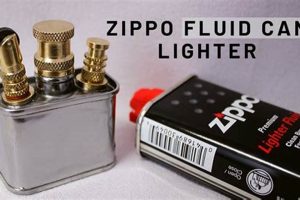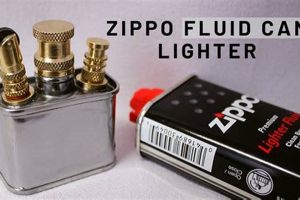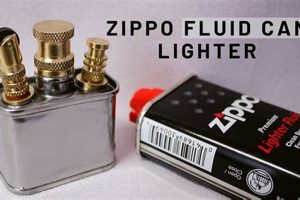High-quality fuel is essential for the optimal function of Zippo-style lighters. Using an appropriate fuel ensures a clean, consistent flame, minimizes clogging, and extends the lifespan of the lighter’s wick and other components. Premium lighter fluids typically use highly refined naphtha, minimizing unpleasant odors and maximizing burn time. Choosing the correct fuel also contributes to a safer user experience by reducing the risk of unwanted flares or sputtering.
A properly fueled lighter is often taken for granted, yet its reliable operation is crucial in various situations, from lighting candles and campfires to igniting cigars and other smoking materials. Historically, Zippo lighters gained popularity due to their windproof design and dependable performance, relying heavily on the availability of quality fuels. This dependability remains a core aspect of their continued appeal. Choosing a premium fluid maintains this historical legacy of consistent functionality.
This discussion will delve further into the characteristics of suitable lighter fluids, exploring the differences between various types and brands, and offering guidance on selecting the optimal choice for a consistent and satisfying lighting experience.
Tips for Selecting Lighter Fluid
Choosing the appropriate lighter fluid is crucial for optimal lighter performance and longevity. These tips offer guidance on selecting and using fuel effectively.
Tip 1: Opt for Premium, Highly Refined Naphtha: Premium lighter fluids utilize highly refined naphtha, which burns cleaner and produces less odor compared to lower-quality alternatives. This reduces clogging and extends wick life.
Tip 2: Avoid Generic or Discount Fuels: Generic fuels often contain impurities that can negatively impact lighter function, leading to inconsistent flames, clogging, and unpleasant odors.
Tip 3: Consider Butane Alternatives for Specific Applications: Butane inserts are available for some Zippo lighters, offering a cleaner-burning, odorless alternative to naphtha. These are ideal for indoor use or scent-sensitive situations.
Tip 4: Fill the Lighter Correctly: Overfilling can lead to leakage and fuel waste. Consult the lighter’s instructions for the proper filling procedure.
Tip 5: Store Lighter Fluid Safely: Lighter fluid is flammable and should be stored in a cool, dry place away from heat sources and children.
Tip 6: Clean the Lighter Regularly: Regular cleaning helps maintain optimal performance and prevent clogs. Consult the manufacturer’s instructions for cleaning recommendations.
Tip 7: Dispose of Empty Fluid Containers Responsibly: Check local regulations for proper disposal of empty lighter fluid containers.
Adhering to these guidelines ensures consistent lighter performance, extends the lighter’s lifespan, and contributes to a safer, more enjoyable user experience.
By understanding the importance of fuel selection and following these practical tips, users can ensure their lighters function reliably for years to come.
1. Purity
Fuel purity is a critical factor influencing Zippo lighter performance and longevity. Impurities can negatively impact functionality, leading to clogging, inconsistent flames, and unpleasant odors. Understanding the role of purity helps users make informed decisions regarding fuel selection.
- Impact on Wick Performance
Impurities in lighter fluid can leave deposits on the wick, hindering its ability to draw fuel effectively. This can result in a weak or inconsistent flame, requiring more frequent lighter maintenance. A pure fuel source minimizes wick clogging, ensuring reliable and long-lasting performance.
- Residue Build-up
Lighter fluid containing impurities can lead to a build-up of residue within the lighter casing. This residue can obstruct the workings of the lighter’s internal mechanisms, affecting its reliability and potentially shortening its lifespan. Premium, purified lighter fluids minimize residue build-up, preserving the lighter’s functionality.
- Odor Control
Unrefined or low-quality lighter fluids often emit a strong, unpleasant odor during combustion. The smell derives from impurities present in the fuel. Highly refined, purer fuels burn cleaner, minimizing or eliminating these undesirable odors. This factor is particularly important for indoor use or situations where strong smells are undesirable.
- Flame Consistency and Color
A pure fuel source burns with a consistent, clean flame, typically blue in color. Impurities can cause flickering, sputtering, or a yellow-tinged flame, indicating incomplete combustion. Consistent flame characteristics are essential for reliable lighter operation and contribute to a more satisfying user experience.
Choosing a high-purity lighter fluid directly contributes to consistent lighter performance, extended lifespan, and a more enjoyable user experience. Investing in a quality, refined fuel ultimately protects the lighter and ensures its reliable operation for years to come.
2. Burn Time
Burn time, a crucial factor in lighter fluid selection, directly impacts user experience and practicality. Extended burn time translates to fewer refills, increased convenience, and enhanced reliability, particularly in situations where consistent flame is required. Understanding the factors influencing burn time helps discern high-quality lighter fluids from inferior alternatives.
- Fuel Quality and Refinement
Highly refined lighter fluids, typically composed of pure naphtha, tend to offer longer burn times compared to less refined options. The refinement process removes impurities that can hinder combustion efficiency. This results in a cleaner, more complete burn, maximizing the energy extracted from the fuel and extending the duration of the flame.
- Lighter Design and Wick Material
While fuel quality plays a primary role, lighter design and wick material also influence burn time. A well-maintained wick made of a suitable material efficiently draws fuel, supporting a consistent flame. The lighter’s construction and windproofing features can further impact how long a single fill lasts by minimizing fuel evaporation and protecting the flame from external factors.
- Environmental Factors
External conditions, such as wind and temperature, can affect burn time. Windproof lighters, like Zippos, minimize the impact of wind, preserving fuel and extending burn time in challenging conditions. Lower temperatures can reduce fuel volatility, potentially impacting burn time, while higher temperatures may increase evaporation.
- Usage Patterns
Individual usage patterns also contribute to perceived burn time. Frequent, short bursts of flame will naturally deplete the fuel reservoir faster than occasional, longer uses. Understanding one’s usage habits can help determine the importance of burn time when selecting a lighter fluid.
Selecting a lighter fluid that prioritizes extended burn time contributes significantly to user convenience and overall satisfaction. By considering fuel quality, lighter design, environmental factors, and usage patterns, users can optimize their lighter’s performance and minimize the frequency of refills, ensuring a reliable flame when needed.
3. Odor
Odor is a significant factor influencing lighter fluid preference. The smell of both unburned and burning fuel can affect user experience and those nearby. Premium lighter fluids prioritize minimizing unpleasant odors, contributing to a more enjoyable and discreet experience.
- Chemical Composition and Refinement
Lighter fluid odor is directly linked to its chemical composition and level of refinement. Less refined fluids often contain impurities that contribute to a strong, sometimes pungent smell. Highly refined naphtha, commonly used in premium lighter fluids, undergoes extensive processing to remove these impurities, resulting in a significantly less noticeable odor, both when unburned and during combustion.
- Impact on User Experience
Strong or unpleasant odors can detract from the overall lighter experience. A neutral or minimally noticeable scent is generally preferred, particularly for indoor use or in close proximity to others. The odor of burning fuel can also affect the taste of cigars or other smoking materials, making odor control a crucial consideration for enthusiasts.
- Indoor vs. Outdoor Use
Lighter fluid odor is a more significant concern for indoor use. In enclosed spaces, smells can linger and become more pronounced. Choosing a low-odor fluid is crucial for maintaining air quality and avoiding unwanted smells indoors. While odor might be less of a concern outdoors, a neutral-smelling fluid is still preferable for a more pleasant experience.
- Alternatives and Considerations
For users highly sensitive to odor, butane inserts offer an alternative for certain Zippo lighter models. Butane burns cleanly and is virtually odorless, providing a distinct advantage in odor-sensitive environments. However, butane requires specific inserts and may not be compatible with all Zippo models.
Careful consideration of odor profiles contributes to a more satisfying lighter experience. Selecting a premium, refined fluid minimizes unpleasant smells, enhancing user enjoyment and minimizing the impact on surrounding environments. Exploring alternatives like butane further expands options for odor-sensitive individuals, demonstrating the importance of odor control in selecting the optimal lighter fluid.
4. Clog Reduction
Clog reduction is a critical aspect of maintaining optimal Zippo lighter performance and longevity. Fuel quality directly influences the frequency and severity of clogging, impacting reliability and user experience. Premium lighter fluids minimize clogging, contributing significantly to a consistently functional lighter.
Residue accumulation within the lighter’s intricate mechanism, particularly the wick and chimney area, is the primary cause of clogging. Lower-quality fuels often contain impurities that do not combust fully, leaving behind deposits that gradually restrict fuel flow. This restriction leads to diminished flame intensity, inconsistent ignition, and eventually, complete failure to ignite. Highly refined fuels, such as premium naphtha, burn cleaner, minimizing residue and reducing the risk of clogs. The difference between a consistently reliable flame and a sputtering, unreliable one often hinges on the fuel’s purity and its ability to minimize clogging.
Consider a camping scenario: relying on a lighter to start a campfire in challenging weather conditions. A clogged lighter can prove frustrating and even dangerous in such circumstances. Choosing a high-quality, clog-resistant fuel ensures reliable ignition when needed most. Similarly, in everyday use, a clog-free lighter provides a consistent, satisfying experience, eliminating the frustration of repeated attempts to ignite. Investing in a premium lighter fluid, though potentially a marginal increase in cost, offers substantial benefits in terms of reliability and longevity, ultimately preserving the lighter’s functionality over extended periods. Consistent performance, free from the interruptions of clogging, solidifies the importance of fuel quality as a central component of a satisfying and dependable lighter experience.
5. Safety
Safety is paramount when handling flammable materials like lighter fluid. Choosing the correct fluid plays a crucial role in mitigating risks associated with lighter use. High-quality lighter fluids, typically composed of highly refined naphtha, are formulated to burn cleanly and predictably, reducing the risk of unexpected flares or uncontrolled ignition. Conversely, inferior or contaminated fuels can exhibit erratic burning behavior, increasing the likelihood of accidents. Proper storage of lighter fluid is equally critical. Storing fluid in approved containers, away from heat sources and out of reach of children, prevents accidental fires and minimizes the risk of ingestion or skin contact. Furthermore, adhering to manufacturer recommendations for filling a lighter helps avoid spills and overfilling, further enhancing safety.
Consider a scenario where an individual refills a lighter using a low-quality fluid containing volatile impurities. Upon ignition, an unexpected flare-up could ignite nearby flammable materials, leading to a significant fire hazard. This risk is substantially mitigated by using a high-quality, refined fuel that burns predictably and consistently. Real-world incidents underscore the importance of proper fluid selection and handling. News reports occasionally feature accidents involving lighter fluid, often linked to improper storage or the use of unsuitable fuels. These incidents highlight the potential consequences of neglecting safety precautions and emphasize the importance of informed decision-making when selecting and using lighter fluid.
Understanding the connection between lighter fluid and safety is essential for responsible lighter use. Choosing a high-quality, appropriately refined fuel is the first step toward mitigating potential hazards. Coupled with safe storage practices and adherence to manufacturer guidelines, informed fuel selection ensures a safer experience, minimizing risks and promoting responsible handling of flammable materials. Prioritizing safety ultimately contributes to a more secure environment and reinforces the importance of treating lighter fluid with the respect it demands.
Frequently Asked Questions
This section addresses common inquiries regarding the selection and use of lighter fluid for Zippo lighters, providing concise and informative responses to facilitate informed decision-making.
Question 1: What is the recommended type of lighter fluid for Zippo lighters?
Highly refined naphtha is generally recommended for optimal performance. It burns cleanly, minimizes odor, and reduces clogging.
Question 2: Can generic lighter fluids harm a Zippo lighter?
Generic lighter fluids may contain impurities that can clog the wick and internal mechanisms, potentially affecting lighter lifespan and performance. Opting for premium, refined fuel is advised.
Question 3: How often should lighter fluid be refilled?
Refill frequency depends on usage. A general guideline is to refill when the flame becomes noticeably weaker or inconsistent. Avoid overfilling.
Question 4: What causes a Zippo lighter to clog?
Impurities in the lighter fluid are the primary cause of clogging. These impurities leave residue that accumulates in the wick and other internal components, restricting fuel flow. Using high-quality, refined fuel minimizes this issue.
Question 5: Are there odorless alternatives to standard lighter fluid?
Butane inserts are available for some Zippo lighter models, providing an odorless alternative. However, compatibility should be confirmed before use.
Question 6: How should lighter fluid be stored safely?
Lighter fluid must be stored in a cool, dry place, away from heat sources and out of reach of children. Always use approved containers and follow local regulations for disposal.
Prioritizing fuel quality and adhering to safety guidelines contributes significantly to a positive and safe lighter experience.
The subsequent sections will explore specific brands and provide further recommendations for selecting the optimal lighter fluid for individual needs.
Optimal Lighter Fluid Selection for Zippo Lighters
Optimal lighter fluid selection is crucial for consistent Zippo lighter performance and longevity. This discussion explored the importance of fuel purity, burn time, odor, clog reduction, and safety in choosing the appropriate fluid. Highly refined naphtha emerged as a preferred choice due to its clean-burning characteristics, minimal odor, and clog-reducing properties. The significance of proper storage and handling practices for ensuring safety was also emphasized. Investing in premium lighter fluid contributes significantly to a satisfying, reliable, and safe lighter experience.
Ultimately, informed fuel selection ensures consistent performance, extends lighter lifespan, and minimizes potential hazards. Choosing a high-quality lighter fluid reflects a commitment to responsible lighter use and appreciation for the enduring functionality of Zippo lighters.







